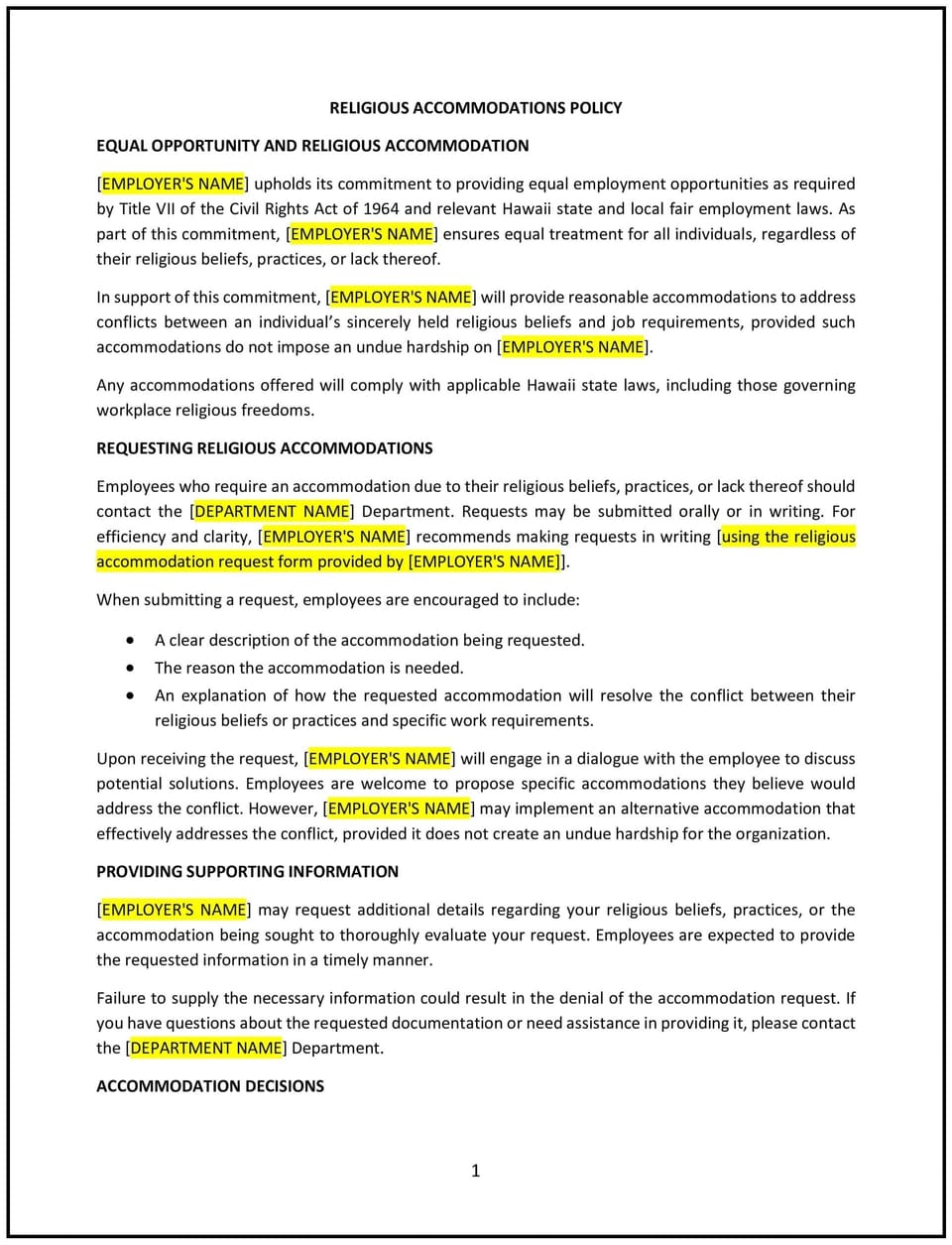Religious accommodations policy (Hawaiʻi): Free template

Religious accommodations policy (Hawaiʻi)
A religious accommodations policy helps Hawaiʻi businesses create a respectful and inclusive workplace by addressing the diverse religious needs of employees. This policy outlines procedures for requesting, evaluating, and implementing religious accommodations, while considering Hawaiʻi’s unique cultural and legal landscape. It is designed to foster a supportive environment where employees feel valued and respected.
By implementing this policy, businesses in Hawaiʻi can promote diversity, reduce potential conflicts, and demonstrate a commitment to inclusivity and fairness.
How to use this religious accommodations policy (Hawaiʻi)
- Define religious accommodations: Clearly explain what constitutes a religious accommodation, such as flexible scheduling, dress code modifications, or time off for religious observances.
- Establish a request process: Outline the steps employees should follow to request a religious accommodation, including whom to contact and what information to provide.
- Evaluate requests fairly: Describe the criteria for evaluating accommodation requests, such as the sincerity of the religious belief and the potential impact on business operations.
- Implement accommodations: Provide guidelines for approving and implementing accommodations, ensuring they are reasonable and do not create undue hardship for the business.
- Communicate the policy: Share the policy with employees during onboarding and through internal communications to ensure awareness and understanding.
- Train managers and staff: Educate managers and employees on the policy’s guidelines, including how to handle requests respectfully and confidentially.
- Monitor and review: Regularly assess the effectiveness of accommodations and address any issues or concerns that arise.
- Update the policy: Periodically review and update the policy to reflect changes in laws, workplace dynamics, or business needs.
Benefits of using this religious accommodations policy (Hawaiʻi)
This policy offers several advantages for Hawaiʻi businesses:
- Promotes inclusivity: A clear policy demonstrates the business’s commitment to respecting and valuing employees’ religious beliefs and practices.
- Reduces conflicts: Structured procedures for handling requests help prevent misunderstandings and foster a harmonious workplace.
- Enhances employee satisfaction: Employees feel supported and respected, which can improve morale and retention.
- Builds trust: Transparent processes for requesting and implementing accommodations build trust between employees and management.
- Supports diversity: The policy encourages a diverse workforce by accommodating a wide range of religious practices and beliefs.
- Improves productivity: Employees who feel respected and accommodated are likely to be more engaged and productive.
- Demonstrates fairness: A consistent and fair approach to religious accommodations reinforces the business’s reputation as an equitable employer.
Tips for using this religious accommodations policy (Hawaiʻi)
- Communicate the policy effectively: Share the policy with employees during onboarding and through regular reminders, such as emails or training sessions.
- Train managers: Educate managers on how to handle accommodation requests respectfully, confidentially, and in accordance with the policy.
- Be flexible: Work with employees to find reasonable accommodations that meet their needs without creating undue hardship for the business.
- Document requests: Keep records of accommodation requests, evaluations, and outcomes to ensure consistency and transparency.
- Address concerns promptly: If issues arise, address them quickly and fairly to maintain a positive workplace environment.
- Review the policy periodically: Update the policy as needed to reflect changes in laws, workplace dynamics, or business needs.
Q: Why should Hawaiʻi businesses adopt a religious accommodations policy?
A: Businesses should adopt this policy to promote inclusivity, respect employees’ religious beliefs, and create a supportive workplace environment.
Q: What types of accommodations might businesses need to provide?
A: Accommodations may include flexible scheduling, dress code modifications, time off for religious observances, or designated spaces for prayer.
Q: How should businesses handle religious accommodation requests?
A: Businesses should establish a clear process for employees to submit requests, evaluate them fairly, and implement reasonable accommodations when possible.
Q: What criteria should businesses use to evaluate accommodation requests?
A: Businesses should consider the sincerity of the religious belief, the nature of the requested accommodation, and whether it would create undue hardship for the business.
Q: What is undue hardship in the context of religious accommodations?
A: Undue hardship refers to significant difficulty or expense for the business. Factors may include cost, operational impact, and workplace safety.
Q: How should businesses communicate the policy to employees?
A: Businesses should share the policy during onboarding, provide regular reminders, and offer training to ensure employees understand their rights and responsibilities.
Q: What should businesses do if an accommodation request cannot be granted?
A: Businesses should communicate the decision respectfully, explain the reasons, and explore alternative solutions if possible.
Q: How often should businesses review the policy?
A: Businesses should review the policy annually or as needed to reflect changes in laws, workplace dynamics, or business needs.
This article contains general legal information and does not contain legal advice. Cobrief is not a law firm or a substitute for an attorney or law firm. The law is complex and changes often. For legal advice, please ask a lawyer.


